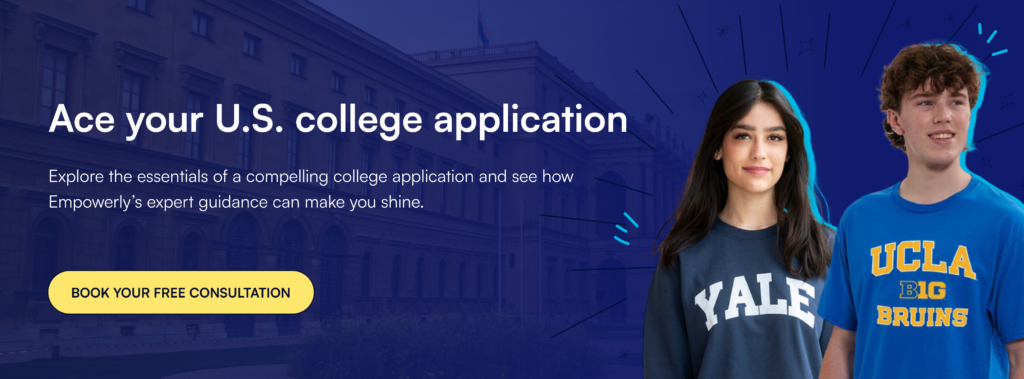Have you ever had to choose what you were going to wear to school the next day, but the choice left you in limbo? Or deciding whether to hang out with friends or get that homework done for tomorrow? We’re with you; there are just so many things we have to choose from every day that can make them feel larger than they need to be.
Choosing a college can feel daunting. With more than 3,500 degree-granting institutions in the United States, each offering distinct characters, campuses, and course selections, how do you find the one that fits you best?
Having in-depth research will be your greatest asset in creating an ideal path to the university that aligns with your career, educational, and financial objectives. Nowadays, we have an incredible opportunity to explore campus culture, academic strengths, and student experiences like never before. Still, many students rely on only conducting surface-level research or using outdated college guides when choosing the place they will spend the next four years (or more).
Your college life is worth more than guessing–it is worth a deliberate research process that will remove the stress of hurrying a choice from you. Creating a well-structured research plan will take control away from others and place it in your hands, empowering you and equipping you to deal with the next phases of this process. Today, we’re going to take a look at different resources you can check out from the comfort of your own home to help you transform your college search and make the right decision for you. Ready to dig in? Let’s go!
Official College Resources
| Tool | Best For | Key Features |
| College Board BigFuture | Comparing schools | Filter by size, location, major, cost; save favorite schools |
| College Navigator | Data deep dive | Government stats on enrollment, aid, graduation rates |
| College Scorecard | ROI-focused research | Avg. earnings, student debt, cost by income level |
| Career outcomes | Alumni jobs, industries, networking potential | |
| YouTube | Real-life student experiences | Dorm tours, vlogs, academic reviews |
| FAFSA4caster | Financial planning | Aid estimates, Pell Grant eligibility |
| Scholarship Engines (Fastweb, etc.) | Free money! | Personalized matches, deadline tracking |

College Websites: Your First Digital Stop
It’s simple, but one of the best tools at your disposal in your college search is surfing the official website of each college. Colleges are eager to impress students like yourself and therefore stock their websites with quality, updated information to allow you to truly experience what they have to offer. Take advantage! As you surf through college websites, make sure to check out:
- Academic program pages: Look for specific requirements for your major, course offerings, and educational experiences that fit your interests and goals. For example, you might find information about the courses required for a Computer Science major or research experiences available through the Biology department.
- Student life sections: Look for campus traditions, resident life, dining facilities, and clubs and activities
- Financial aid calculators: Nearly every college now has net price calculators, which give you estimates of your costs based on your financial situation
- Virtual tours: Take advantage of 360-degree campus tours that allow you to explore the school’s facilities anywhere in the world
Be sure to bookmark interesting programs, opportunities, courses, or staff you are drawn to. This information can be helpful in your application, especially when writing targeted essays for your future applications. You can utilize what you learn to produce refined and more elaborate responses to the prompts found in a lot of applications and help bring your interests to admissions officers on a more advanced level!
Social Media Channels: The Unfiltered Campus Perspective
We all love being on our phones, but who would have thought they could also be an exploratory tool for college research? The Instagram, Facebook, Twitter, and TikTok pages of a college offer window glimpses into campus life that are likely to appear more authentic than brochures. Make sure you look at:
- The university’s official social media handles
- Pages of specific academic departments you’re interested in
- Student groups/clubs (every university likely has a club(s) for any of the activities/hobbies/interests you will have!)
- Any residence/housing life that you might be interested in associated with the school
Social media can reveal a college’s personality and values in ways that brochures and websites cannot, making it a valuable asset for understanding what you can expect as a student, both inside and outside the classroom.
Independent Objective Research Platforms
College Board’s BigFuture: The Comprehensive Database
Thought the College Board was only for the SAT? Not quite; it’s also suitable for researching different colleges you may be considering for application. The College Board’s BigFuture platform is one of the most reliable and comprehensive college search tools, allowing you to:
- Filter colleges by dozens of criteria, including location, majors, size, and cost
- Compare institutions side-by-side
- Access standardized data on admissions statistics, diversity, and outcomes
- Create a personalized college list that syncs with your College Board account
The cool thing about BigFuture is that it provides an easy apples-to-apples comparison between institutions, thanks to its extensive database of schools nationwide. Their platform provides key metrics, including graduation rates, average financial aid packages, student demographics, and available majors, all in one location. You can then pick and view universities side-by-side to see how those statistics stack up and help make your decision easier. Whether comparing a small liberal arts college to a large public university or trying to gauge value versus cost, BigFuture offers a reliable foundation!
College Navigator: The Government’s Official Database
Another tool at your disposal is the National Center for Education Statistics’ College Navigator! It may not be the flashiest, but it provides the most accurate and comprehensive information available to help you analyze schools on your list. This government-operated database offers:
- Detailed enrollment statistics and demographics
- Comprehensive financial aid information
- Retention and graduation rates
- Athletic program information
Run by the National Center for Education Statistics (NCES), College Navigator provides clear, reliable, and current information, helping students obtain the necessary information and create a balanced picture of the universities they wish to attend.
Specialized Research Tools
LinkedIn University Pages and Alumni Tool
LinkedIn is not just for finding jobs or building connections; it can also be used for your college research! LinkedIn offers one of the most underutilized yet valuable resources through its university pages and alumni tool. With these features, you can:
- See where graduates from specific programs work
- Identify typical career trajectories for students with your intended major
- Connect with alums in fields you’re interested in
- Evaluate the strength of professional networks by industry and location
LinkedIn can be surprisingly effective for your research. The information you’ll find can support how effectively a college promotes career outcomes in your chosen area. Additionally, you can participate in LinkedIn groups associated with schools, connect with alumni for informational interviews, and gain insight into the professional networks of different institutions!
YouTube: Virtual College Visits and Student Vlogs
If you’re like most, you may spend a great deal of time on YouTube. It’s not just fun to watch silly videos of cats; YouTube has also become an excellent resource for college research. You’ll find a variety of content around university life, including:
- Student-made “day in the life” videos
- Dorm tour vlogs
- Academic experience testimonials
- Admission advice from current students
These real accounts often reveal information about campus life that promotional pamphlets don’t showcase. For example, ‘day in the life’ vlogs made by students offer first-hand comments regarding the life of the students at specific colleges, and dorm tour vlogs give you an idea of what to anticipate from dorms and student facilities. (Read the comments–sometimes current students or alumni add bits of wisdom!)
Quick Tip: Be Sure to Vet the Info You Find
Not everything online is accurate or up to date. Be sure to see:
- Was this video or post created in the last year or two?
- Is the person a real student or affiliated with the school?
- Do they cite facts or just share opinions?
- Is there a diversity of voices and perspectives?
- Cross-reference what you hear with official college sites to get the full picture.
Financial Aid and Affordability Resources
FAFSA4caster: Preview Your Federal Aid
Along with campus culture and academic offerings, consider the costs when choosing the right university for you. Keeping your finances in mind during your research allows you to select institutions that fit your family’s financial situation and other relevant criteria. You can use a tool like Federal Student Aid’s FAFSA4caster, which estimates your eligibility for federal financial aid. This tool can assist you in:
- Predict your possible eligibility for a Pell Grant
- Know the likely availability of federal loans that you can qualify for
- Gather more accurate estimates of the cost of attendance
- Prepare financially for different college scenarios that might present themselves to you
FAFSA4caster is a valuable early financial aid planning tool that helps you develop a balanced college list with financially sustainable options, introducing you to a wide variety of university options that may not have been previously available or considered.
College Scorecard: ROI and Outcomes Data
When deciding which college to attend, consider what each college can do for you years after graduation (Return on investment, anyone?). One tool that is not utilized enough is the U.S. Department of Education’s College Scorecard, which provides plenty of valuable information about colleges and universities. This includes:
- Average annual cost by income bracket
- Graduation rates
- Student loan repayment statistics
- Post-graduation earnings by field of study
- Comparison tools for similar institutions
This resource can be invaluable, enabling you to determine whether a school will be a good investment and providing you with the ability to weigh long-term fiscal realities against academic and social fit.
Scholarship Search Engines
One thing that many students overlook when considering how to pay for college is the availability of scholarships. Scholarships provide an excellent way for students to get free money for all kinds of various criteria, from interests to academic interests to even unusual contests you never thought of (such as making a prom dress out of duct tape, anyone?)! Websites like Fastweb, Scholarships.com, and Going Merry can be used to identify various scholarships for which you can apply based on your unique profile. These profiles allow you to:
- Create personalized scholarship matches
- Track application due dates
- Save essay drafts and recommendation letters
- Get notifications for new scholarships
Scholarships play a significant role in the United States in addressing financial need for millions of students and can significantly impact college affordability. It is for this reason that they are great opportunities to explore when examining institutional financial aid data, as they create more opportunities to consider when building your college list.

Your Next Steps: Taking Action on Your Research
With a greater sense of the numerous tools at your fingertips for research, gearing you up for the upcoming college semester, it is time to develop a plan that will make your time and effort on your college search worthwhile. Below are five tips to help you get started:
1. Determine your 3–5 college must-haves
We all have some things that are total deal-breakers when it comes to our hobbies and interests, things that we feel comfortable with, and what we daydream about when we’re thinking about attending college. These are all essential things to consider when you’re creating your college lists and planning out the next chapter of your life. Some of these can be:
- Academic programs or clubs –Are there good programs in your area(s) of interest offered by the school? What types of clubs and activities do you want to get involved in, both within and outside of your academic major? What is important to you in extracurricular activities?
- Location & environment – Would you rather live in an urban or rural setting? Do you want to be near home or further away in a new state or area? Do you wish to attend school near the beach, the mountains, or the city? What other facilities do you need when away from home (like a gym, a nice library, or good food offerings)?
- Campus Culture – Do you want a large, vibrant campus or a tiny, close-knit community? Do you prefer attending large football games or going out with friends on a night out? What level of involvement are you interested in having within the campus community?
- Affordability – What does the cost of attendance look like? Is there ample financial aid and scholarships available? What about grants, loans, and work-study programs offered by universities?
- Career Development & Outcomes – What sort of internships, job placement, or alumni networks does the school provide? Does the school offer a specific major or career track that interests you?
Use these values as your guide as you dive deeper into your research. Ensure that you select schools that satisfy these key factors. There is no perfect school for everyone, but finding a university that best meets your non-negotiables will have a significant impact on your experience when the time arrives.
2. Establish a plan that fits your life
We understand that life gets hectic! Juggling school, extracurricular activities, test preparation, and daily life might make it seem like there’s just not enough time to do thorough college research. However, if you break down the process into smaller parts, it becomes manageable. Here are some tips to help you:
- Invest 30–60 minutes a few times a week to explore college websites, virtual tours, and student reviews, taking note of anything that stands out to you.
- Develop little, weekly activities, such as reading about 2–3 schools or comparing financial aid policies, to prevent information burnout.
- Choose times of your day that won’t conflict with school, work, or after-school activities—early morning, study halls, or weekends might be ideal!
3. Create a Centralized Research Hub
Sample College List Table
| School | Why it fits me | Location | Size | Programs of Interest | Net Cost (est.) | Notes |
| University A | Strong bio program, close to home | Illinois | Mid-size | Biology, Neuroscience | $17,000 | Loved their student vlogs! |
| University B | Great financial aid + urban setting | California | Small | English, Psychology | $9,500 | Need to visit or do virtual tour |
As with any quality research study, staying organized is key to success. If you enjoy writing things down, using technology, or a combination of both, having a system in place to keep current on your research will be worth it when comparing schools and staying ahead of next steps. You can:
- Utilize Spreadsheets to monitor schools, criteria, deadlines, and requirements.
- A computer note-taking software (like Notion, OneNote, or Google Docs) to write down your ideas, pros/cons, or questions for the admissions staff. You can even create a calendar to stay up-to-date on upcoming deadlines, ensuring you don’t miss any important dates.
- Maintain a well-organized research system that includes PDFs, flyers, or screenshots, so all relevant information is conveniently accessible in one place.
Remember, this research isn’t something you’re going to complete in one sitting; it’s an ongoing process that will evolve as you approach your senior year! The more you explore your interests and preferences as you grow as a student, the more you’ll learn about yourself and what matters to you. These factors will all impact what you ultimately want in your college experience!
4. Take Action Weekly
All things are better in bite-sized bits! Select one specific action step to implement every week, such as:
- Signing up for a virtual tour or information session
- Browsing student life on social media sites
- Subscribing to a college mailing list
- Watching YouTube content around different universities and their offerings
The college search process can be quite challenging. With these excellent online tools and a focused approach, you will discover institutions that align with your educational goals, things you enjoy, and what you want to do for your future career. And who knows, maybe you’ll have some fun along the way!

What If You Don’t Have Constant Internet Access?
Ask your school counselor or local library if they can help:
- Print college brochures or profiles for you
- Access YouTube or LinkedIn during designated time slots
- Set up virtual tours on school computers.
- Many schools also host in-person college fairs; use those events as opportunities for hands-on research.
College Research Myths to Avoid
- “I should only apply to big-name schools.” –> Fit matters more than prestige.
- “I’ll just look at the U.S. News rankings.” –> Rankings are narrow and sometimes biased.
- “I’ll know the right school by the vibe alone.” –> Vibes help, but data + goals matter too.
- “Financial aid isn’t worth researching yet.” –> The earlier you understand aid, the better your list will be.
Ready to Take Your College Research to the Next Level?
Your college experience is unique, and your research approach should be, too. While these online resources are an incredible place to begin, having expert professionals on your side can transform your college search from good to great. With Empowerly, our expert counselors help students uncover aspects that regular research might overlook—from identifying off-the-radar best-fit colleges to understanding admissions advantages at specific schools.
Success is a team effort, and we’re in this together. From start to finish, we’re by your side, making sure every step you take brings you closer to your dreams.
